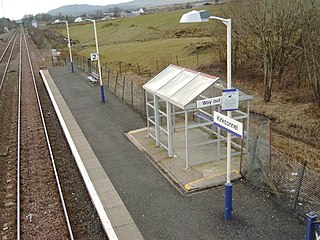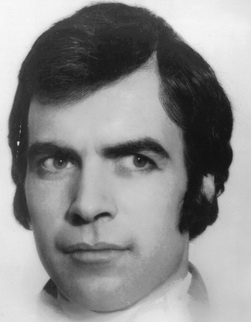Kris Haddow (born Kris Clark on 24 June 1981) is a Scottish playwright, poet and performer, originally from Kirkconnel in Dumfries and Galloway. [1] [2]
Kris Haddow (born Kris Clark on 24 June 1981) is a Scottish playwright, poet and performer, originally from Kirkconnel in Dumfries and Galloway. [1] [2]
Born in Dumfriesshire in 1981, Haddow was raised in the former mining village of Kirkconnel and schooled in neighbouring Sanquhar. He moved to Paisley, Renfrewshire, in 2000 with the ambition of pursuing acting as a career. He spent ten years appearing in musicals and plays with various community theatre and profit share companies in Glasgow while working as a supporting artist with companies such as Scottish Ballet, the National Theatre of Scotland and BBC Scotland.
Haddow graduated the University of Glasgow with an MLitt in creative writing with merit in 2016. Before this, he had studied creative writing over several years at the Open University with a focus on writing for the stage. During this period, he started to produce a body of short stories and poems written in his native Lallans tongue, developing a passion for Scots language dialect representation. He returned to the Open University in 2019/20 to complete the BA (Hons) arts and humanities with creative writing he had originally started, graduating with first-class honours. He is now[ when? ] a PhD research candidate at University of Glasgow on its Doctor of Fine Arts creative writing programme.
A classically trained baritone, Haddow's voice was coached by two private tutors over an eight-year period. Though he received no formal acting training, he attended night schools at both the Royal Conservatoire of Scotland and the Citizens' Theatre, where he went on to appear as both musician and supporting artist in several studio and main stage productions.
His plays and monologues include The Bench (2009), Ronnie's Story (2010), 2h:9m:37s (2011) first produced for the Scottish Mental Health Arts and Film Festival, Make Your Move (2011) and A Not So Dirty Protest (2012) which were performed and broadcast live online as part of the National Theatre of Scotland's Five Minute Theatre events. [3] He was mentored by the Playwrights' Studio, Scotland, in 2011/12, and announced as one of the Traverse Fifty in 2013, where 50 emerging writers were selected to work with the Traverse Theatre as part of its 50th anniversary celebrations. [4]
In April 2011, Haddow was named winner of 'see me' Scotland's inaugural Creative Writing Award for his Scots language entry Ronnie's Story, [5] judged by the author Lari Don and awarded by Scots Makar Liz Lochhead.
In January 2012 "Windows for Burns Night" was launched by The Stove in Dumfries, inviting contemporary poets from around the world to write poems to be displayed in windows around the town after the fashion of Robert Burns, who famously scratched lines of verse using a diamond point pen.Haddow's poem, "On Times Austere", was announced as the winning submission, with an engraving of the poem in glass being permanently installed at The Globe Inn in Dumfries alongside replicas of Burns' original work. [6]
In May 2021, it was announced in The Bookseller that Haddow had made the shortlist for the North Lit Agency Prize [7] with a work in progress tentatively titled When the Curlew Cries No More. Set in the south of Scotland, it is being developed as his first full length novel under the supervision of the bestselling author Carolyn Jess-Cooke on the University of Glasgow's Doctor of Fine Arts creative writing programme. This book went on to win the Pitch Perfect event [8] for emerging authors at the Bloody Scotland Crime Writing Festival in September 2021.

Allan Ramsay was a Scottish poet, playwright, publisher, librarian and impresario of early Enlightenment Edinburgh. Ramsay's influence extended to England, foreshadowing the reaction that followed the publication of Percy's Reliques. He was on close terms with the leading men of letters in Scotland and England. He corresponded with William Hamilton of Bangour, William Somervile, John Gay and Alexander Pope.
The Scottish Renaissance was a mainly literary movement of the early to mid-20th century that can be seen as the Scottish version of modernism. It is sometimes referred to as the Scottish literary renaissance, although its influence went beyond literature into music, visual arts, and politics. The writers and artists of the Scottish Renaissance displayed a profound interest in both modern philosophy and technology, as well as incorporating folk influences, and a strong concern for the fate of Scotland's declining languages.
John Mayne (1759–1836) was a Scottish printer, journalist and poet born in Dumfries. In 1780, his poem The Siller Gun appeared in its original form in Ruddiman's Magazine, published by Walter Ruddiman in Edinburgh. It is a humorous work on an ancient custom in Dumfries of shooting for the "Siller Gun." He also wrote a poem on Hallowe'en in 1780 which influenced Robert Burns's 1785 poem Halloween. Mayne also wrote a version of the ballad Helen of Kirkconnel. His verses were admired by Walter Scott.

Kirkconnel is a small parish in Dumfries and Galloway, southwestern Scotland. It is located on the A76 near the head of Nithsdale. Principally it has been a sporting community. The name comes from The Church of Saint Conal. In 1850 the village had only a single street. Next to Kirkconnel is a separate village called Kelloholm.
Liz Lochhead Hon FRSE is a Scottish poet, playwright, translator and broadcaster. Between 2011 and 2016 she was the Makar, or National Poet of Scotland, and served as Poet Laureate for Glasgow between 2005 and 2011.

The Glasgow South Western Line is a mainline railway in Scotland that runs from Glasgow to Kilmarnock, and then either Carlisle via Dumfries, or Stranraer via Ayr, with a branch to East Kilbride.

Kirkconnel railway station is a railway station in the town of Kirkconnel, Dumfries and Galloway, Scotland. The station is unstaffed, owned by Network Rail and managed by ScotRail.
Raman Mundair is a British poet, writer, artist and playwright. She was born in Ludhiana, India and moved to live in the UK at the age of five. She is the author of two volumes of poetry, A Choreographer's Cartography and Lovers, Liars, Conjurers and Thieves – both published by Peepal Tree Press – and The Algebra of Freedom published by Aurora Metro Press. She edited Incoming – Some Shetland Voices – published by Shetland Heritage Publications. Mundair was educated at the School of Oriental and African Studies, University of London, and has performed readings of her work at numerous venues Raman's work has been anthologised and received reviews in publications including The Independent, The Herald, World Literature Today and Discovering Scottish.
Robert McLellan OBE (1907–1985) was a Scottish Renaissance dramatist, writer and poet and a leading figure in the twentieth century movement to recover Scotland’s distinctive theatrical traditions. He found popular success with plays and stories written in his native Scots tongue and is regarded, alongside William Lorimer, as one of the most important modern exponents of fine prose in the language.
Alan Wilkins was a Scottish playwright.

John Cairney was a Scottish stage, film and television actor who found fame through his one-man shows on Robert Burns, Robert Louis Stevenson, Robert Service, Charles Rennie Mackintosh and William McGonagall.

Robert Burns, also known familiarly as Rabbie Burns, was a Scottish poet and lyricist. He is widely regarded as the national poet of Scotland and is celebrated worldwide. He is the best known of the poets who have written in the Scots language, although much of his writing is in a "light Scots dialect" of English, accessible to an audience beyond Scotland. He also wrote in standard English, and in these writings his political or civil commentary is often at its bluntest.
Janet Violet Paisley was a writer, poet and playwright from Scotland, writing in Scots and English. Her work has been translated into German, Russian, Lithuanian, Slovak, Spanish, Hungarian, Ukrainian, Italian and Polish.

Karen Campbell is a Scottish writer of contemporary fiction. Her first four novels, while billed as police procedurals, form a quartet set in Glasgow which goes behind the uniform, to examine the lives of people who just happen to be police officers, and feature Sgt. Anna Cameron and Cath and Jamie Worth. Her fifth novel, published in 2013, breaks away from the world of the police. It tells the story of Abdi, a Somali asylum-seeker newly arrived in Glasgow with his young daughter, and of recently widowed Deborah, who has been assigned as mentor to help them settle in. The novel was selected as the BBC Radio Four Book at Bedtime in April 2013. Now published by Canongate, Campbell has written eight novels, the most recent being Paper Cup, which follows the journey of homeless woman Kelly.

Theatre in Scotland refers to the history of the performing arts in Scotland, or those written, acted and produced by Scots. Scottish theatre generally falls into the Western theatre tradition, although many performances and plays have investigated other cultural areas. The main influences are from North America, England, Ireland and from Continental Europe. Scotland's theatrical arts were generally linked to the broader traditions of Scottish and English-language literature and to British and Irish theatre, American literature and theatrical artists. As a result of mass migration, both to and from Scotland, in the modern period, Scottish literature has been introduced to a global audience, and has also created an increasingly multicultural Scottish theatre.
The Theatre Royal in Dumfries, Scotland is the oldest working theatre in Scotland. The Theatre is owned by the Guild of Players who bought it in 1959, thereby saving it from demolition. The Guild's aim is to promote the tradition of live theatre in Dumfries. It is the venue for the Guild of Players' own productions and for performances from visiting companies. In addition it is used extensively as a venue for the Dumfries and Galloway Arts Festival, the Dumfries Music Festival and the Dumfries Musical Theatre Company.

Scottish literature in the eighteenth century is literature written in Scotland or by Scottish writers in the eighteenth century. It includes literature written in English, Scottish Gaelic and Scots, in forms including poetry, drama and novels. After the Union in 1707 Scottish literature developed a distinct national identity. Allan Ramsay led a "vernacular revival", the trend for pastoral poetry and developed the Habbie stanza. He was part of a community of poets working in Scots and English who included William Hamilton of Gilbertfield, Robert Crawford, Alexander Ross, William Hamilton of Bangour, Alison Rutherford Cockburn, and James Thomson. The eighteenth century was also a period of innovation in Gaelic vernacular poetry. Major figures included Rob Donn Mackay, Donnchadh Bàn Mac an t-Saoir, Uillean Ross and Alasdair mac Mhaighstir Alasdair, who helped inspire a new form of nature poetry. James Macpherson was the first Scottish poet to gain an international reputation, claiming to have found poetry written by Ossian. Robert Burns is widely regarded as the national poet.

Burns Clubs exist throughout the world to encourage and cherish the memory of Robert Burns, to foster a love of his writings and generally to encourage an interest in the Scots Language and Literature. An emphasis on encouraging the young to take an interest in Burns is found in most clubs through poetry, singing and other competitions. Once mainly existing as 'male only' clubs in the mould of the Tarbolton 'Batchelor's Club' most now welcome women as fellow members. Ladies Burns Clubs also exist such as the 'Irvine Lasses' that was established in 1975; it has appointed several male 'Honorary Lasses'.
Len Pennie is a Scottish poet and Scots language and mental-health advocate. She became known on social media in 2020 during the COVID-19 pandemic in Scotland for her "Scots word of the day" and poem videos.
Ebenezer Picken was a Scottish poet and songwriter known as "The Poet of Paisley." He wrote poetry in English and Scots and produced a dictionary of Scottish words which was published posthumously.